
Deciding where to build your online presence can be tricky. Wix and Ecwid are two popular website builders, but they cater to slightly different needs. Wix is a full-fledged website creation platform that allows you to design and build an entire website, including an online store. Ecwid, on the other hand, focuses specifically on eCommerce, offering a solution where you can integrate smoothly into existing websites.
Choosing between these two options can be confusing. This post simplifies your decision by comparing Wix and Ecwid in detail. You'll get a clear picture of their features, pricing, ease of use, and everything else that matters. Whether you're just starting out or already selling online, this review will help you pick the best website builder for your needs.
Wix Vs. Ecwid: Comparative Overview
Wix and Ecwid are both popular platforms that serve distinct purposes in website creation and eCommerce. While Wix offers a comprehensive website builder with strong design capabilities, Ecwid focuses on providing eCommerce solutions that can integrate with existing websites.
Here's a comparative overview on the strengths and limitations of each platform, helping you determine which one aligns best with your digital goals:
|
Price |
Ease of Use |
Design and Customization |
Features and Functionality |
Customer Support |
|
|
Wix |
$4.50 per month |
|
|
|
|
|
Ecwid |
$1,200.00 per month |
|
|
|
|
Pricing and Value: Wix or Ecwid
Wix and Ecwid offer different pricing structures tailored to meet the needs of diverse users, from small business owners to large enterprises.
Pricing Plans: Overview
Wix and Ecwid offer a range of pricing plans to suit different needs, but the value you get for your money varies.
Here's an overview of the pricing plans for both platforms.
|
Free |
Connect Domain |
Combo |
Unlimited |
VIP |
|
|
Wix |
$0.00 per month |
$4.50 per month |
$8.50 per month |
$12.50 per month |
$24.50 per month |
|
Free |
Venture |
Business |
Unlimited |
||
|
Ecwid |
$0.00 per month |
$25.00 per month |
$45.00 per month |
$105.00 per month |
Wix offers five pricing tiers, starting with a free plan that includes basic features and Wix branding. It then scales up to a VIP plan at $24.50 per month, offering extensive features and more generous resource allocations for large or growing sites.
Ecwid, primarily an eCommerce platform, also starts with a free tier, suitable for small merchants, and extends up to an Unlimited plan at $105 per month, designed for large businesses needing advanced e-commerce capabilities. Both platforms cater to a range of needs, from basic website functionalities to comprehensive eCommerce solutions, allowing users to choose a plan based on their specific requirements and budget
Value of Money
Wix provides a broad spectrum of web development tools within its packages, from basic site-building capabilities in its free plan to advanced features like increased storage, removal of ads, and enhanced customer support in its premium plans. This makes Wix a versatile option for both novice users and businesses looking to expand their online presence.
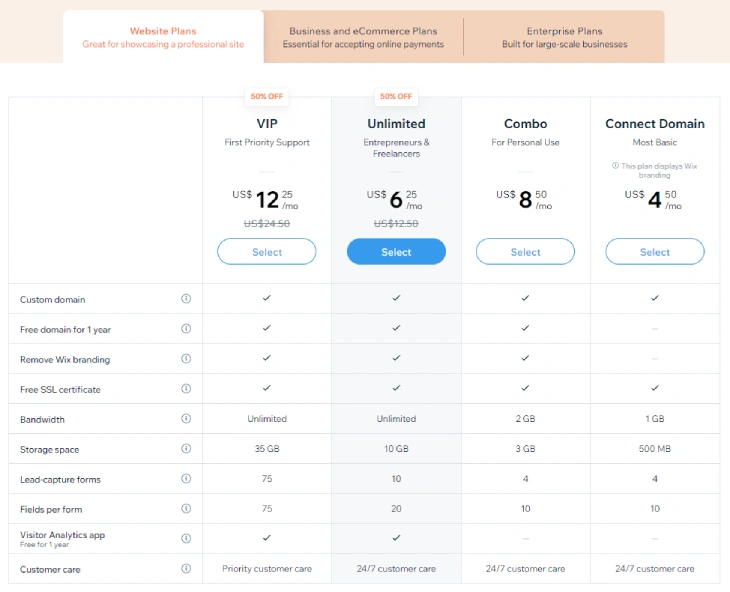
Ecwid, on the other hand, focuses on eCommerce and is geared toward sellers who want to integrate online stores with existing websites or platforms. Its plans are structured to accommodate everything from a small startup with a few products to large retailers needing extensive inventory management and advanced analytics. Given its specialized nature, Ecwid offers significant value for users focused primarily on e-commerce, providing strong tools and features tailored to online selling at each pricing level.
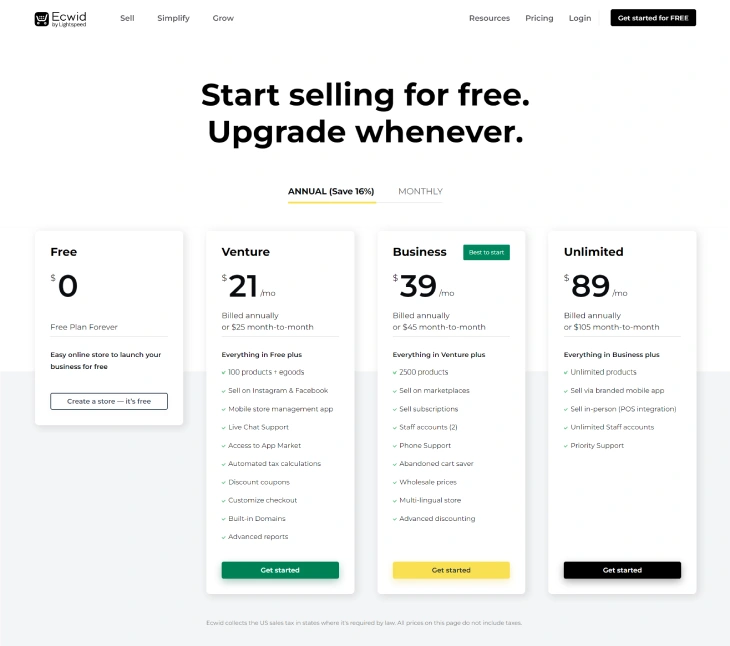
Ease of Use: Wix or Ecwid
Wix and Ecwid are designed to simplify the website creation process, but they do so in slightly different ways. This comparison focuses on how user-friendly each platform is, highlighting the tools and features that facilitate a smooth web-building experience for users of all skill levels.
Drag-and-Drop Editors
Wix and Ecwid both offer drag-and-drop editors but cater to slightly different needs. Wix's editor is known for its extensive flexibility, allowing users to move and customize elements anywhere on their web pages freely. This makes it ideal for those who want full control over their site's design, from layout to detailed customization.
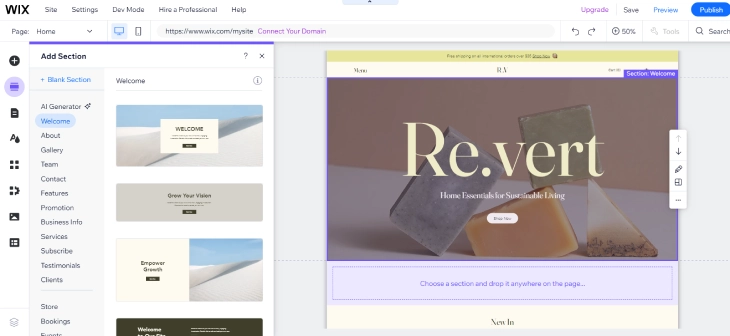
Ecwid, on the other hand, focuses more on eCommerce functionality. While its drag-and-drop capabilities are less about extensive site design and more about integrating and managing eCommerce elements efficiently, it excels in enabling users to add online store features to existing websites quickly and easily. This approach is particularly beneficial for those who wish to enhance a current site with e-commerce capabilities without a complete redesign.
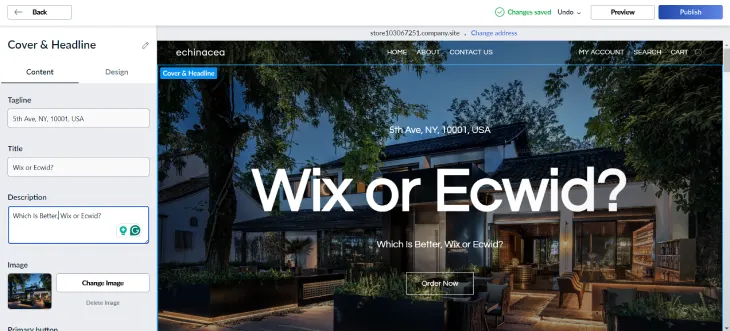
Site Navigation and Editing
Wix offers a highly intuitive site editor that allows for deep customization of navigation and site layout, enabling users to design their websites exactly as envisioned. Its drag-and-drop interface makes organizing site menus and content blocks easy, ensuring a smooth user experience both in design and navigation.
Ecwid is primarily an eCommerce platform that provides tools for editing and setting up online store navigation but is more limited in overall site design. Its editor is geared towards integrating e-commerce capabilities into an existing website rather than building one from scratch.
Design and Customization: Wix or Ecwid
Design and customization are key aspects of website building that determine how effectively a site resonates with its audience. Wix and Ecwid offer distinct approaches to design, each with its own set of tools and options for personalization.
Templates
Wix and Ecwid offer different approaches to templates, catering to varying user needs. Wix is known for its vast library of customizable, free templates across numerous industries, allowing users to choose a design that closely aligns with their business or personal aesthetic. These templates are fully editable with Wix’s drag-and-drop editor, allowing users to adjust layouts, colors, fonts, and more to create a unique website.
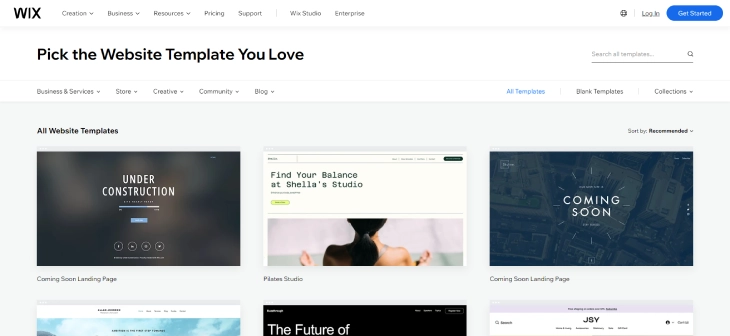
Ecwid, on the other hand, does not focus primarily on providing a wide range of website templates because it is designed to be added to existing websites. Instead, it offers a set of customizable storefront widgets that can be embedded into any site, regardless of the platform it's built on. Ecwid is particularly useful for users who want to add eCommerce functionality to their already-designed websites without a major overhaul.
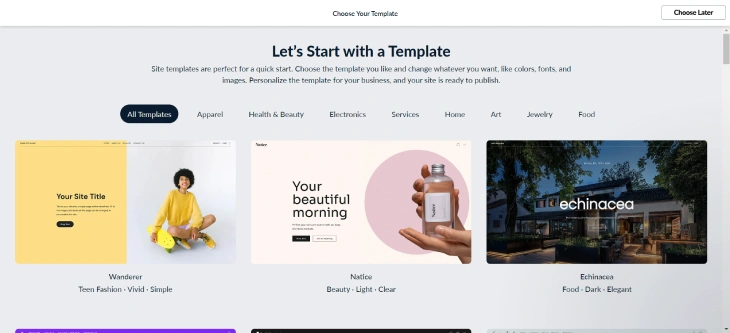
Design Flexibility
Wix and Ecwid serve different purposes and offer varied levels of customization. Wix stands out for its exceptional design flexibility, providing users with a powerful drag-and-drop editor that allows nearly unlimited customization of website elements. Users can adjust everything from the site layout to the smallest design details, making Wix ideal for creating highly personalized and visually distinctive websites.
Ecwid, on the other hand, is focused more on enhancing existing websites with eCommerce capabilities rather than offering extensive design customization. While Ecwid allows some adjustments to the look and feel of its shopping cart widgets and checkout features to blend smoothly with the host website, it does not provide the broad design manipulation that Wix does. Ecwid is ideally suited for users who are content with their existing website design and looking to add online store functionality.
Another option for those who seek high levels of design control and flexibility is Webflow. The platform offers superior capabilities with its sophisticated CSS and HTML customization tools.
Features and Functionality: Wix or Ecwid
When selecting a platform for building and managing websites, the features and functionality offered are pivotal factors to consider. Wix and Ecwid both bring unique strengths to the table, catering to diverse web development needs that could fulfill your requirements for creating and operating a successful online site.
eCommerce
Wix provides a comprehensive eCommerce solution within its website builder, allowing users to create, design, and manage online stores directly through its platform. Wix eCommerce includes features like product listings, payment options, and customer management tools integrated into the user-friendly Wix environment.
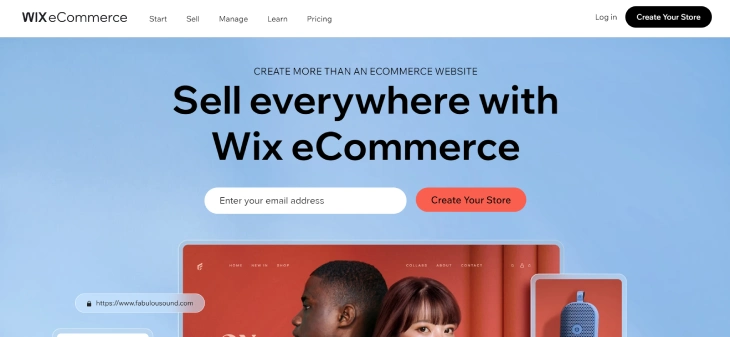
Ecwid, on the other hand, excels as an eCommerce add-on rather than a standalone website builder. It is designed to be integrated into any existing website, making it an ideal choice for those who already have a site and want to start selling online without switching platforms. Ecwid's strength lies in its ability to seamlessly plug into websites built on various platforms, providing strong eCommerce functionalities such as inventory management, multi-channel selling, and mobile-optimized shopping carts.
While Ecwid effectively integrates eCommerce into existing sites, Shopify could also be highlighted as a standalone solution that provides extensive eCommerce features, making it ideal for businesses focused on online sales.
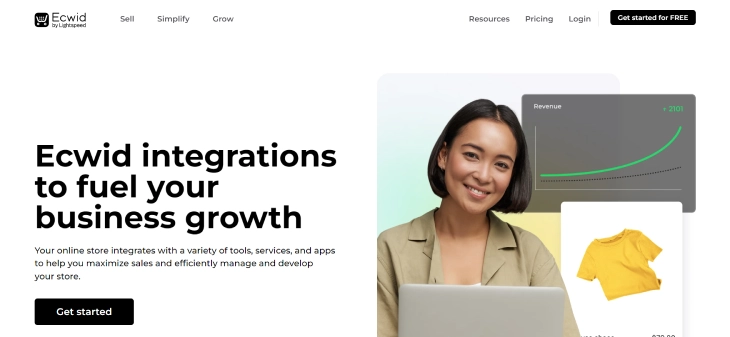
SEO
Wix has built a reputation for providing a range of SEO tools integrated into its website builder. These tools include options for customizing meta tags, alt texts for images, and URL structures, alongside more advanced features like Google Search Console integration. This makes Wix particularly attractive for users who want a more hands-on approach to optimizing their site directly within the creation process.
Ecwid, while not a standalone website builder, also supports SEO for any eCommerce elements added to existing sites. It ensures that product pages are optimized for search engines, featuring customizable URLs, meta descriptions, and titles. Since Ecwid is used primarily as an e-commerce solution within existing websites, overall site SEO will also depend heavily on the host site’s capabilities and settings.
WordPress is another notable option because of its extensive plugin ecosystem, which can greatly enhance a website's search engine optimization beyond the basic tools provided by Wix and Ecwid.
Third-Party Integrations
Wix has a strong App Market filled with a wide range of third-party applications that can be easily integrated into any Wix website. These apps cover everything from advanced eCommerce solutions to social media feeds, marketing tools, and customer relationship management systems. This integration capability allows Wix users to enhance their sites with additional features.
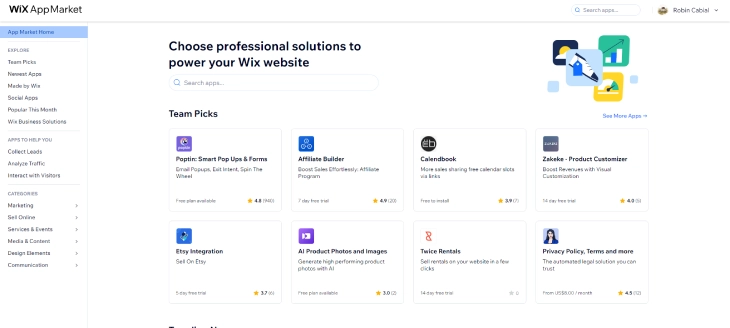
Ecwid also excels in third-party integrations, particularly in the realm of eCommerce. It is designed to work smoothly with many platforms, including WordPress, Weebly, and Joomla, allowing users to add full-featured eCommerce functionality to existing sites. Ecwid's integrations extend to popular payment gateways, shipping, and inventory management tools that make it ideal for business owners looking to expand their online sales capabilities without disrupting their current website setup.
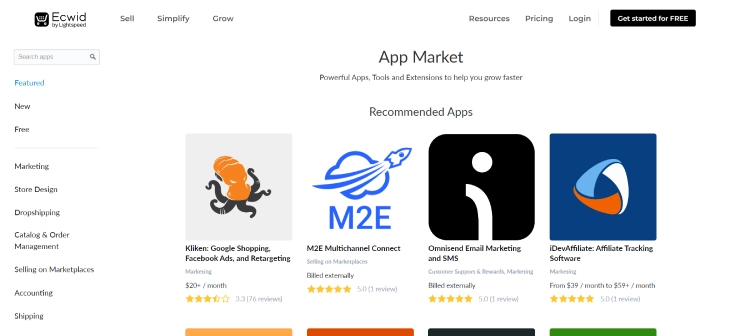
Customer Support: Wix or Ecwid
Choosing the right platform for your online needs often comes down to the quality of customer support available. Both Wix and Ecwid recognize this importance and offer dedicated support services to their users.
Support Channel
Wix and Ecwid offer a range of support channels, including email, phone, and live chat. Wix offers more extensive support, including a knowledge base and video tutorials, and Wix's support is available 24/7.
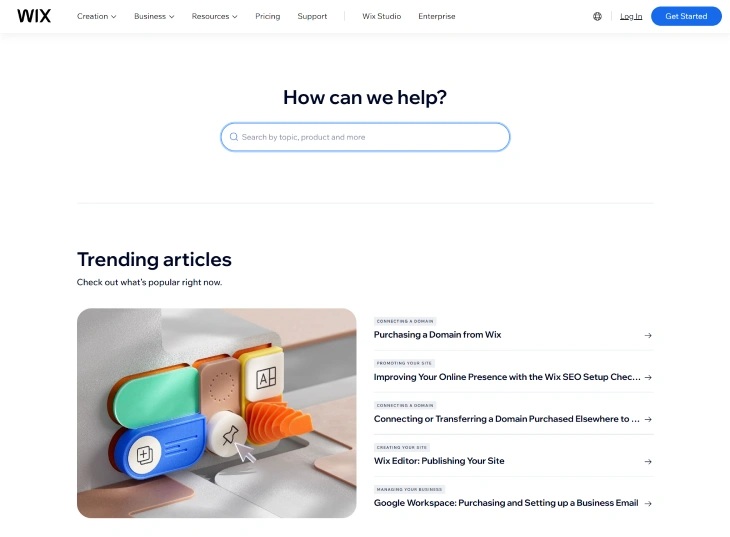
Ecwid also provides support but not as extensive as Wix's. Ecwid's support is available during business hours, and Ecwid's knowledge base is more limited in resources.

Support Quality
Wix and Ecwid offer high-quality support, but Wix's support is more comprehensive. Wix's support team is knowledgeable and responsive, and Wix's support resources are extensive and easy to use. Ecwid's support team is also knowledgeable and responsive, but Ecwid's support resources are more limited in resources.
Conclusion: Which Is Better, Wix or Ecwid?
Choosing between Wix and Ecwid ultimately depends on your specific needs and goals. Wix is ideal for users looking for a comprehensive website builder with a wide range of design and functionality options, making it suitable for creating personalized, visually appealing websites. Ecwid is better suited for those primarily interested in eCommerce, offering powerful tools to integrate sales capabilities into existing sites or platforms smoothly. Both platforms provide strong solutions in their fields, so the better choice will align with whether your priority lies in web design flexibility or eCommerce functionality.
Other platforms like WordPress, Webflow, and Shopify might also be considered. Your decision should still be based on your business’s complexity, technical needs, and future growth plans. Each platform offers unique advantages that could better align with your specific requirements.
* read the rest of the post and open up an offer